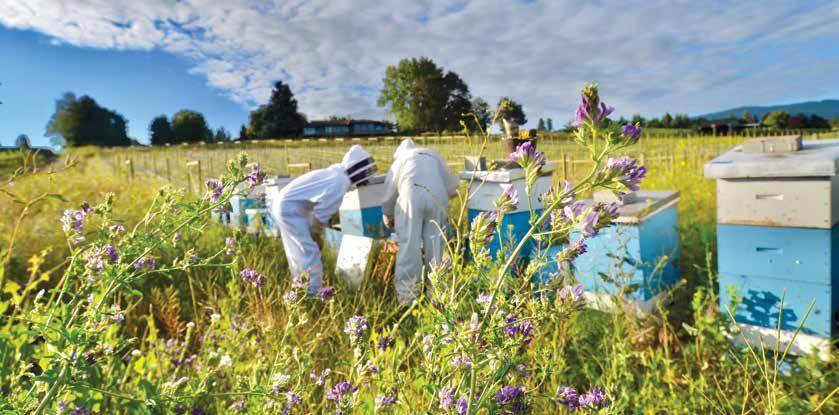
6 minute read
Hive mentality: Vineyards play ideal hosts for beekeeping
Hive Mentality
Beekeeping in Canada’s vineyards
by Tammy Schuster
More than a hobby or a daring stunt, beekeeping is a growing fascination for many. Whether it’s for honey production, ecosystem balance, or mental health, bees provide a different benefit for each person.
“There is definitely more interest in beekeeping,” says Chelsea Abbott.

Abbott, master beekeeper at Lenora Bee Apiary, manages several hives located on the grounds of the Blue Grouse Estate Winery in the Cowichan Valley.
She says beekeeping is very different
in each region. For example, the West Coast doesn’t have the same monofloral crops as other regions, “Instead of canola and clover, we have delicate arbutus and blackberry blooms. So we require a site with a diverse flora that enables the bees to forage year round.”
This makes vineyards an ideal
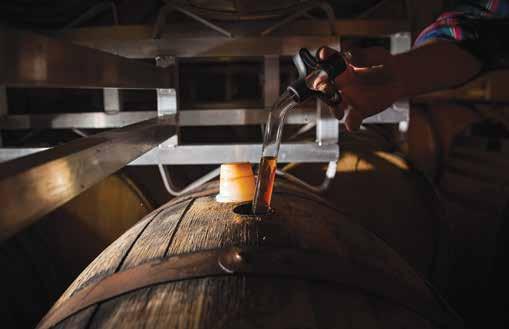
setting for hives. Grapes themselves are self-pollinating and do not require fuzzy little pollinators, but the honey bees have been known to help fruit sets and cover crops that grow between the rows encouraging a diverse biosphere within the vineyard.
Blue Grouse began to transition their vines to organic several years ago along with their cover crops. “Their cover crops are planted at staggered times throughout the year, so my honey bees are able to forage and sustain themselves all year long.”
Honey aside, with happy bees came
Creating honey wine at Rosewood Estates Winery & Meadery.
another bi-product: more bees. With the honey bees thriving, the huge population in bees means that Abbott is able to breed and sell local Cowichan Valley bees. Locally bred honey bees are significant because the majority of honey bees in Canada are actually imported stock from locations such as Australia, New Zealand, California, and Hawaii.

The increased public interest in beekeeping prompted Abbott to start the Hive Share Program at Lenora Bee Apiary where subscribers attend monthly hands-on tutorials about management techniques, pest and disease training, and biology of the honey bee. The participants then receive a small honey bee colony, known as a nuc, the following year to begin their own beekeeping journey at home.
“People from all walks of life manage the hives in such unique ways depending on what they need,” she says. One of Abbott’s clients who works in pest control has a personal

Chelsea of Lenora Bee Apiary tends to a few bees at Blue Grouse Estates Winery.
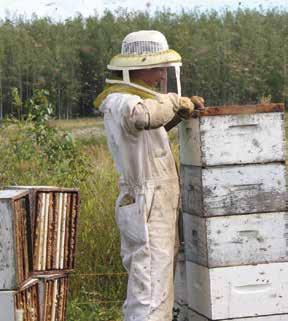
hive for honey production. Another is an emergency room doctor who manages her hive purely for the peace and tranquility it brings to her.
The Rosewood Estates Winery & Meadery in Beamsville, Ontario has had hives on their vineyard since 2005 and manages 300 bee hives around their property on the Niagara escarpment, as well as at other vineyards in the area. The close proximity to nectar, pollen, and fresh water, along with protection from weather and natural predators make for ideal conditions for strong and healthy hives.
William Roman, general manager and beemaster, says his grandfather started it all as a teenager living in the Ukraine when he caught a wild swarm of bees and turned it into a school project. He brought his passion for beekeeping to Canada in the 1960s and passed it along to his son and grandson.
Crimson clover crops planted between the grape vines at Blue Grouse Estates Winery.
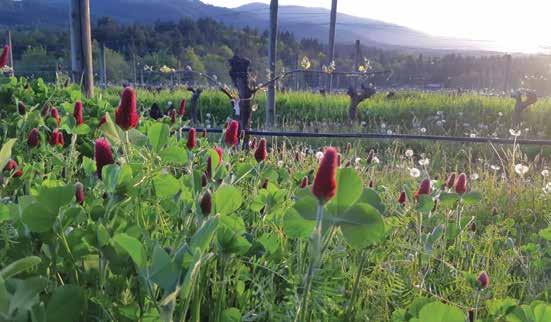
It was Roman’s father, Eugene, who built the winery and meadery after a promise he made to his wife during their honeymoon. The family’s 90- year beekeeping history along with their other passion, winemaking, has allowed them to develop some custom products.
In addition to award-winning red, white, and rose wines, Roman produces limited releases of fortified honey wine. Once such creation involved placing chardonnay into decommissioned cognac barrels and adding honey at peak fermentation. “We turbo charged the natural fermentation using honey,” says Roman. “Now we have this beautiful chardonnay, cognac-esque honey wine that was fermented exclusively in ex-cognac barrels that we fortify to 20 per cent alcohol. It drinks like a white port with flavours of chardonnay, honey, and waxy poetic notes of cognac.”
Another creation just released is Pomme D’or (golden apple), which is comprised of raw apple cider juice and burnt honey, and is aged in French oak barrels before moving into old Calvados barrels for additional aging. “It’s absolutely something special,” says Roman. “One of a kind.”
In addition to tastings and tours, the Rosewood Estates Winery offers tours to bee-curious visitors and Roman also gives presentations about honey bees and beekeeping to various school groups and horticultural societies in the region.
The bee hives located at Tantalus Vineyards in Kelowna are part of the vineyard’s dedication to sustainability. Owned by Arlo’s Honey Farm, the hives can be seen from the winery’s tasting room, and with lots of open space, the hives are surrounded by apple and pear orchards as well as the vineyard.
Tantalus practices natural farming methods on the vineyard, and their ecosystem is reinforced by the preservation of a 10-acre natural, dry-land forest located in the centre of the property. Among many sustainable features, Tantalus has constructed environments to encourage populations of beneficial bird species and bats, and is SalmonSafe Certified, and acts as host to the 40-hive apiary.
In addition to maintaining the health and vigor of the natural ecosystem, the bees also ensure the orchards, soft fruits, and vegetable farms that surround the property remain productive. The vineyard provides honey to their dining guests and offer jars to purchase in their tasting room.
“Having another species present increases our biodiversity,” says Felix Egerer, vineyard manager. “And bees are great at housework. During harvest, if the berries pop due to heavy rain or if birds peck at the fruit, the bees come and clean the nectar from the grapes and vines reducing the risk of diseases taking hold.”
In addition to maintaining the health and vigor of the natural ecosystem, the bees also ensure the orchards, soft fruits, and vegetable farms that surround the property remain productive. Tantalus also offers jars of vineyard honey to purchase in their tasting room.
With wine tastings reopening around B.C., the winery has just extended their hours of operation and offers a sit-down, reservationonly experience. This allows staff to spend more time with guests while maintaining the provincial health and safety standards.
“Especially during a year like this one, I find it very calming to be around the bee hives,” says Egerer. “To the bees, it’s just business as usual.” o
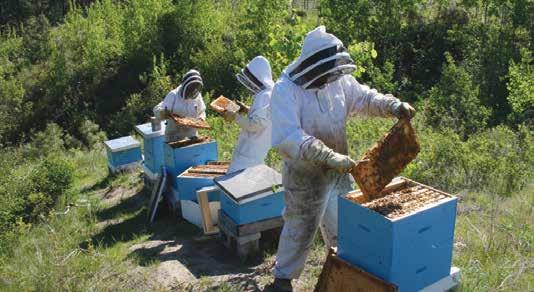
Checking Arlo’s Honey Farm hives at Tantalus Vineyards.









